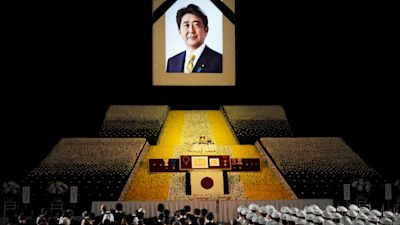Protests form as Japan mourns assassinated former PM Shinzo Abe at state funeral

A rare and controversial state funeral for assassinated former Prime Minister Shinzo Abe began in tense Japan where the event for one of the country’s most divisive leader has deeply split public opinion.
Division was apparent in the streets of Tokyo where both protestors and mourners carrying bouquets of flowers continued to gather.
One person leaving flowers praised Abe as “a great figure who brought Japan back to the international level.”
Former Prime Minister Theresa May and US Vice President Kamala Harris were among the 4,300 people attending the state funeral.
But G7 leaders and Japan’s main opposition parties are not.
Prime Minister Fumio Kishida says his mentor Abe deserves a state funeral. He and Abe's widow will be among the speakers.
Abe’s widow, Akie Abe, in a black formal kimono, walked slowly into the Budokan hall venue carrying an urn containing her husband’s ashes, placed in a wooden box and wrapped in a purple cloth with gold stripes.
Defence soldiers in white uniforms took Abe’s ashes and placed them on a pedestal filled with white and yellow chrysanthemum flowers and decorations.
Government, parliamentary and judicial representatives, including Prime Minister Fumio Kishida, will make condolence speeches, followed by Akie Abe.
Abe was cremated in July after a private funeral at a Tokyo temple days after he was assassinated while giving a campaign speech on a street in Nara, a city in western Japan.
Kishida says Japan's longest-serving post-war political leader deserves a state funeral.
But the undemocratic decision to give him the rare honour with imperial ties, the cost, and controversies about his and the ruling party's ties to the ultra-conservative Unification Church have fuelled controversy about the event.
Tokyo was under maximum security, with angry protests opposing the funeral planned. Hours before the ceremony, hundreds of people carrying bouquets of flowers queued at public flower-laying stands at nearby Kudanzaka park.
Masayuki Aoki, a 70-year-old business owner, recalls his “fist bump” with Abe when he came to Yokohama, near his home, for campaigning just days before he was killed. “I'm emotionally attached to him and I've been supporting the LDP, too," he said. “I had to come to offer him flowers."
Masae Kurokawa, 64, who also offered Abe flowers, praised him as “a great figure who brought Japan back to the international level.”
The government maintains that the ceremony is not meant to force anyone to honour Abe. Japan's main political opposition parties are not attending the event, which critics say is a reminder of how pre-war imperialist governments used state funerals to fan nationalism.
In what some see as an attempt to further justify the honour for Abe, Japan's PM Kishida this week has held meetings with visiting foreign leaders in what he calls “funeral diplomacy.”
The talks are meant to strengthen ties as Japan faces regional and global challenges, including threats from China, Russia and North Korea.
He was to meet about 40 foreign leaders through Wednesday, but no G7 leaders are attending.
Why are some opposed to Shinzo Abe receiving a state funeral?
Japan's former premier Shinzo Abe - one of the nation's most powerful and influential figures - died after he was shot while delivering a campaign speech.
While much of the world rallied behind another state funeral, that of Queen Elizabeth II, just over a week ago, the decision to hold a state funeral for Japan's former prime minister has been mired in controversy.
Reportedly costing around £10.1m, initial polls suggested that over half the population were against the event being hosted.
In Japan, a state funeral is usually reserved for members of the Imperial Family - only once since World War Two has a politician been given the same honour. Marking Abe's state funeral as a momentous occasion.
And, while the politician was mourned in Japan after he was gunned down at an election rally in June - opinion polls had never suggested he was hugely popular even if he had brought stability and security to the island nation.
Making the decision to host a state funeral in his honour is one that marks his stature not his popularity.
Want a quick and expert briefing on the biggest news stories? Listen to our latest podcasts to find out What You Need To Know.
Japan's Prime Minister Fumio Kishida has been criticised for forcing through the costly event and over the widening controversy about Abe's and the governing party’s decades of close ties with the ultra-conservative Unification Church, accused of raking in huge donations by brainwashing adherents.
Abe's alleged assassin reportedly told police he killed the politician because of his links to the church; he said his mother ruined his life by giving away the family's money to the church.
“The fact that the close ties between the LDP and the Unification Church may have interfered with policymaking processes is seen by the Japanese people as a greater threat to democracy than Abe’s assassination,” wrote Hosei University political science professor Jiro Yamaguchi in a recent article.
Abe’s grandfather, former Prime Minister Nobusuke Kishi, helped the church take root in Japan and is now seen as a key figure in the scandal. Opponents say holding a state funeral for Abe is equivalent to an endorsement of ruling party ties to the Unification Church.